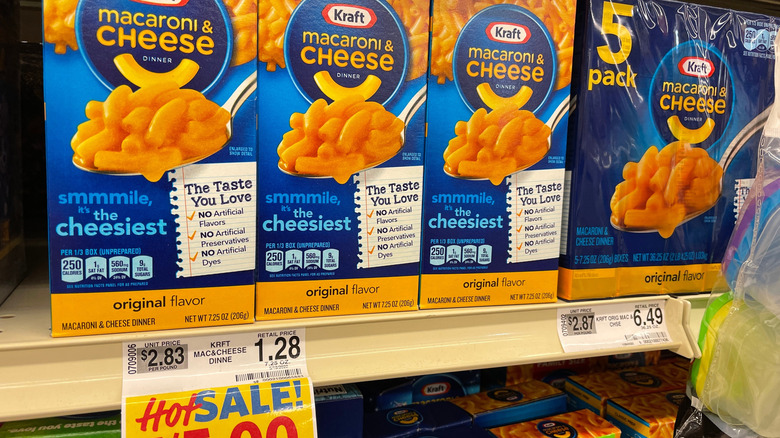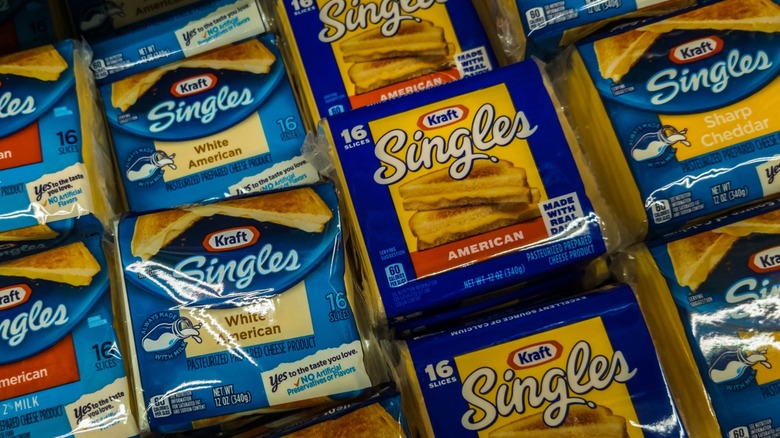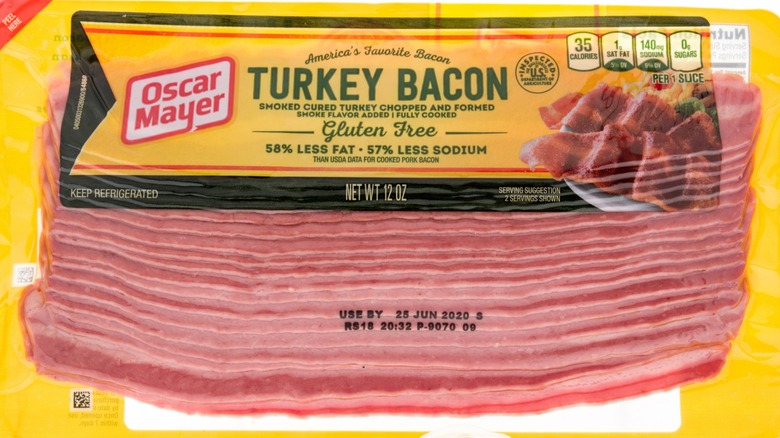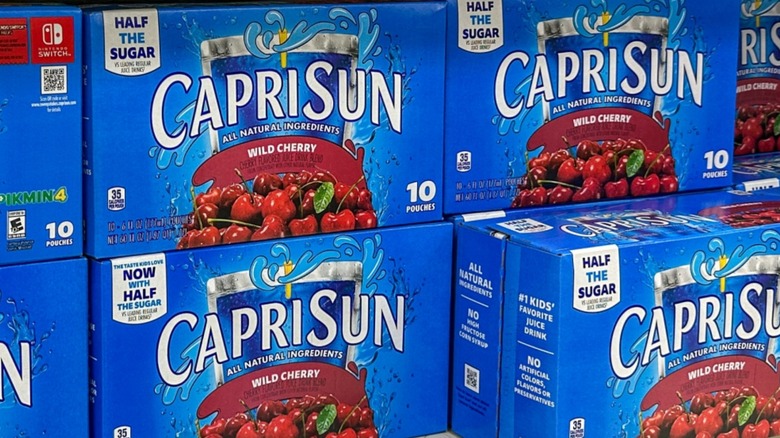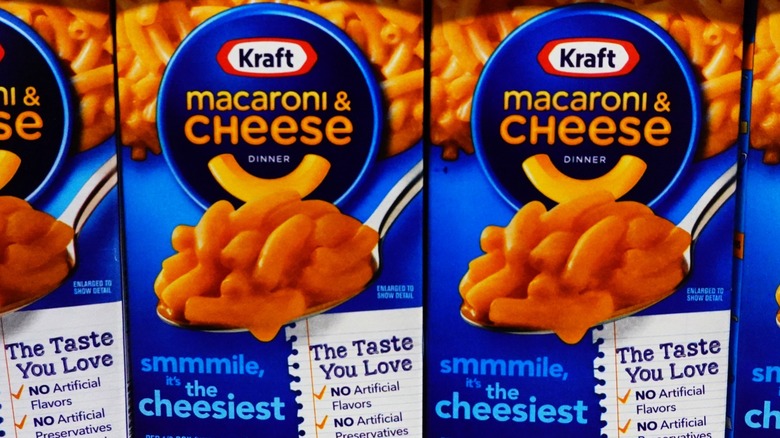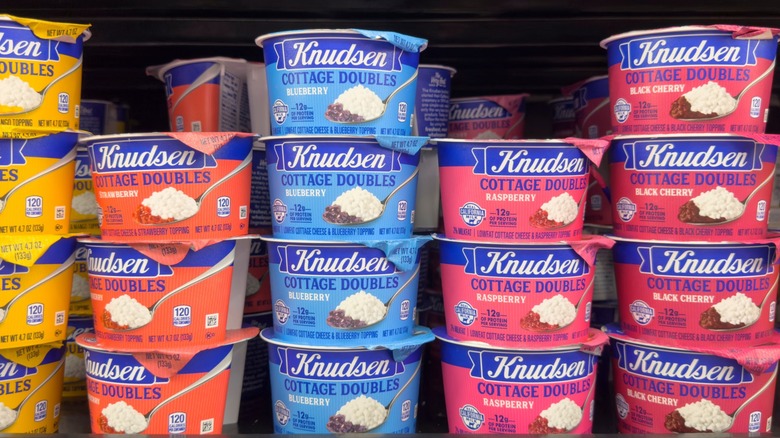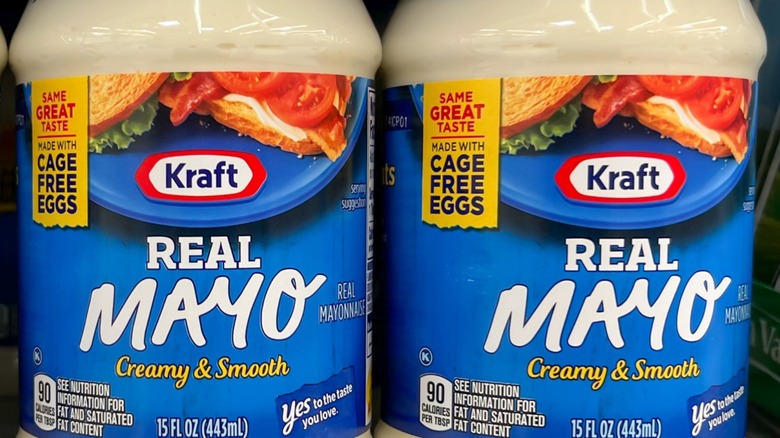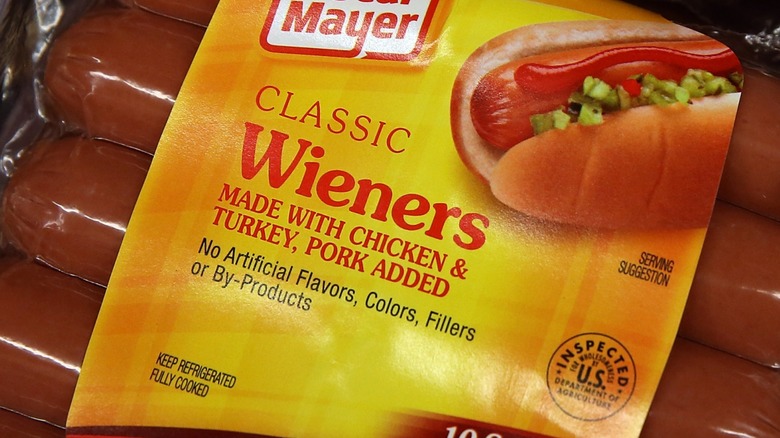Kraft Food Recalls That Affected Millions
We may receive a commission on purchases made from links.
It's more than a century old, and throughout its entire history, Kraft has been one of the biggest suppliers of packaged foods, cheese, dairy products, processed meats, and pantry staples. There's so much more to Kraft than macaroni and cheese, however. At various times over the last 100 years, the company that started out as a horse-drawn cheese wagon in Chicago has controlled the production of sale of Philadelphia cream cheese, Tombstone pizza, Oreo cookies, Ritz crackers, Oscar Mayer hot dogs and luncheon meat, Post cereals, Jell-O (whatever that is), Kool-Aid, Entenmann's pastries, and Cadbury chocolate.
In other words, Kraft has always made a lot of food for a lot of people and has tremendous power and pull in the supermarket economy. Due to food safety issues, food-borne illness outbreaks, and other problems that make products dangerous or impossible to sell or consume, Kraft has overseen numerous product recalls of its own items and those of its subsidiaries. Here are the most significant recalls in Kraft (or as its now known, Kraft Heinz) history.
Velveeta Cheesy Skillets were made with soy and not labeled properly
The Kraft brand name became synonymous with scientifically created, shelf-stable cheese in large part due to Velveeta. Those soft bricks of salty, savory, and easily meltable and versatile cheese-like goo were invented in 1923, and an early incarnation of Kraft bought The Velveeta Cheese Company in 1927. Velveeta has long been a household name, and Kraft has attempted several brand extensions that utilize the popular processed cheese. One such series of products is an array of Velveeta Cheesy Skillets. Similar to Hamburger Helper in that the boxed dinners provide everything necessary for a hearty family meal with the exception of fresh meat, the Velveeta Cheesy Skillets make use of packets of a starch, seasonings, and Velveeta.
In 2014, Kraft's contracted Velveeta Cheesy Skillets manufacturer Truitt Brothers announced through the U.S. Department of Agriculture's Food Safety and Inspection Service that it would recall a recent production order of the Ultimate Cheeseburger Mac dinner kits. Neither Truitt Brothers nor Kraft had advised customers with an advisory label that the kits contained hydrolyzed soy protein and dried soy sauce. Those are both derivatives of soybeans, a major food allergen. The recall applied to microwaveable Ultimate Cheeseburger Mac packs made between May 2013 and January 2014, which added up to 1.77 million pounds of product.
Plastic keeps sticking to Kraft Singles
Also known as pasteurized prepared cheese product, or American cheese, Kraft Singles are a marvel of food science. This heavily processed cheese-like sandwich filler can stay fresh for months if properly stored, and they come in packages of conveniently individually wrapped slices. The thin plastic that seals the cheese has given Kraft a lot of trouble over the years. In July 2015, the Kraft Heinz Company set into motion a voluntary recall of two production lines of Kraft Singles packaged in various permutations. Four-pound and 3-pound containers of Kraft Singles in both the American and White American flavors bearing particular manufacturing codes were found to make consumers accidentally choke. A small piece of the plastic wrapper had a tendency to stick to the cheese; consumers may not notice that, try to eat the cheese with the plastic still intact, and then choke. Kraft Heinz initially recalled a total of about 36,000 cases of the cheese slices distributed primarily in the U.S. and its territories. In September 2015, Kraft called for a bigger recall over the same plastic issue, asking back another 335,000 cases bound for Central America and South Korea.
Eight years later, Kraft Heinz issued a third voluntary recall of Kraft Singles. It wanted 83,800 cases of product returned and refunded because once more, a factory issue led to strips of inedible film remaining on the cheese.
Taco Bell Queso dip was recalled over botulism concerns
People are turning to Taco Bell to save money, but when they want those fast-food flavors in the comfort of their own home, they may seek out the chain's line of packaged, jarred, and bottled condiments and kits. Taco Bell contracts with Kraft to make those products, which once included a spicy veggies-and cheese mix, the Taco Bell Salsa Con Queso Mild Cheese Dip.
In July 2018, The Kraft Heinz Company, with the assistance of the Food and Drug Administration, asked consumers to return any of the queso dip they hadn't eaten. The food conglomerate ordered the voluntary recall of 7,000 cases of 15-ounce jars when it found out that certain lots were prone to separation. The dip would break down into its various components inside the jars, which isn't in and of itself dangerous, but it can lead to the right environment for the proliferation of Clostridium botulinum. Otherwise known as botulism, if that bacteria is consumed, it can cause damage to the body's nervous, muscular, respiratory systems, or be fatal. Kraft didn't receive any word of customers suffering from food-borne illness, but it recalled the queso out of an abundance of caution.
Oscar Mayer turkey bacon went bad early and made people sick
One of the most famous brands controlled by Kraft Heinz is Oscar Mayer, purveyor of refrigerated meat products like bacon, hot dogs, and lunchmeat. It's also a leading producer of turkey bacon, which, if the labels on Oscar Mayer's packages of the stuff are to be believed, is significantly healthier than its pork fat-based counterpart, passing on less fat and even sodium to the consumer. In August 2015, neither Kraft nor Oscar Mayer could speak to the safety and superiority of its turkey bacon, temporarily. After some consumers who had purchased and eaten Oscar Mayer turkey bacon complained of sickness, the company investigated and discovered that a lot of the meat had a tendency to go bad — and cause illness — well before its printed expiration date.
With the U.S. Food Safety and Inspection Service assisting, Heinz recalled approximately 2.1 million pounds of turkey bacon. Included in the pullback: Oscar Mayer Selects Uncured Turkey Bacon, Oscar Mayer Turkey Bacon Smoked Cured Turkey Chopped and Formed, and Oscar Mayer Turkey Bacon Smoked Cured Turkey Chopped and Formed. The public returned more than 755,000 pounds of potentially tainted bacon to Kraft, which had been distributed around the U.S. and to St. Martin and the Bahamas.
Wild Cherry Capri Sun was made with cleaning fluid
When the hot summer months arrive, one great way to cool down is with a Capri Sun. Setting itself apart from the competition by arriving in store shelves in pouches instead of boxes, Capri Sun was first sold in the U.S. in 1982. For the last few decades it's been distributed locally by Kraft. The heavily sweetened juice-based drinks are available in a multitude of flavors, including Wild Cherry. In summer 2022, some Capri Sun consumers noticed that the beverage didn't taste the way it usually did, and they contacted Kraft to complain. By August, Kraft had started to recall 5,760 cases of Capri Sun Wild Cherry.
The company determined that some runs of the drink had been made on food processing gear in which diluted cleaning agents had recently been applied. The strange flavor customers noted had been the faint taste of industrial cleaning products. As Capri Sun is sold in boxes of 10 pouches, this amounted to a recall of 230,400 total pouches that had to be taken out of circulation.
Kraft Macaroni and Cheese Dinner was laced with metal shavings
A cheap, comfort food loved by adults and children alike, macaroni and cheese can be found in most any grocery store in North America. Kraft's Macaroni and Cheese Dinner, or Kraft Dinner as it's known in Canada, was the first of many brands that combines dried elbow pasta with a sealed envelope of powdered processed cheese, arriving in stores in 1937. It's a flagship Kraft product more than 80 years later, and the food conglomerate still sells about a million boxes of Macaroni and Cheese Dinner every day.
This means that a 2015 recall of Kraft Macaroni and Cheese took out of the food system about a week's worth of the supply of the product. After eight consumers filed complaints about finding traces of metal in their food, Kraft decided to try to get back the potentially injurious metal-contaminated mac and cheese. A run of the original flavor of the product was made on faulty machines, and that worked out to 242,000 cases, or around 6.5 million boxes. A Kraft spokesperson offered an explanation. "We believe a piece of stainless steel got wedged in a metal piece of equipment, which may have generated friction that resulted in small pieces of metal potentially falling into the product," Joyce Hodel told the Los Angeles Times.
Various cottage cheese brands were recalled for spoilage issues
In terms of breadth of product and the total number of units affected, a recall of cottage cheese in May 2014 is one of the largest bring-backs in Kraft's storied history. The company asked for consumers to not eat and return to the point of purchase cottage cheese containers that had been stamped with particular plant codes. That covered four Kraft owned and operated brands: Breakstone's, Simply Kraft, Knudsen, and Daily Chef. Full-fat, low-fat and fat-free, small curd and regular curd, and non-flavored and products mixed with pineapple, peach, blueberry, strawberry, raspberry, mango, and apple cinnamon were all involved in the recall.
Kraft acted so grandly, seeking to recover 1.2 million cases of cottage cheese — around 7.2 million to 14.4 million individual containers — because of public health risks. Some materials used in the creation of the product may have been stored at an improper temperature. That may have made the cheese a more hospitable environment for the pathogens that cause food-borne illness to develop.
Four years later, Kraft put forth another cottage cheese recall, albeit for a different contamination issue. In November 2019, Kraft asked customers to get rid of three kinds of Breakstone's cottage cheese — 2% Milkfat Lowfat Large Curd, 4% Milkfat Large Curd, and 4% Milkfat Small Curd — because of the possible presence of plastic and metal bits. One consumer reported finding those foreign objects in a Breakstone's product, and Kraft recalled 9,500 cases of those cottage cheese styles.
Kraft Real Mayonnaise was full of insects
After starting out as a cheese company, Kraft bought other companies and expanded its product line in the early 20th century, introducing Kraft Mayonnaise in 1930. The company later renamed that jarred condiment Kraft Real Mayonnaise and made it the signature item in a whole line that also included lower-fat, fat-free, and homestyle versions, as well as varieties made with different flavors and ingredients, including Kraft Real Mayonnaise with Pure Lemon Juice.
On store shelves by the late 1970s, the Food and Drug Administration worked with Kraft on a recall of the lemon-spiked mayo in May 1978. An inspection uncovered evidence that thousands of units were produced and then distributed to more than 4,000 shops in the southern United States with a different extra ingredient Kraft didn't intend for the mayo: deceased bugs. The FDA claimed that accidentally eating insects wouldn't harm consumers, but they still asked for the return of more than 4,000 caseloads of lemon mayonnaise. Making homemade mayo is easy, and all the more of an attractive option knowing that stuff like this can happen.
Taco Bell taco shells were made with illegal corn
Beginning in the mid-1990s and after decades of research and development, the FDA approved for sale the GMOs, or genetically modified organisms. These were crops made to be more hearty or taste better, or different, via the manipulation of their DNA. Tomatoes, soybeans, potatoes, summer squash, and corn were among the first GMO produce items sold in the United States. However, not every kind of scientifically-built corn was approved for human consumption. One variety, StarLink, had received a go-ahead from the FDA to be used for animal feed. In 2000, Kraft Foods used that same corn in taco shells it was contracted to produce for more than 7,000 Taco Bell restaurants in the U.S. and in Taco Bell branded shells sold in grocery stores.
In September 2023, Taco Bell recalled every Taco Bell taco shell made with what was forbidden corn, the first time a product had to come back over GMO concerns. Supermarkets removed them from shelves and restaurants used an alternate supplier until the recall-associated products were out of its system and replaced with shells made from non-GMO corn.
Kraft recalled trail mix made with pistachios over potential salmonella contamination
When Kraft Foods bought Nabisco in 2000, it thereby acquired Standard Brands, maker of Planters branded nuts and snacks. As of 2021, Planters is owned by Hormel Foods, but when it was a division of Kraft, its pistachios were subject to a big and urgent recall. The FDA announced in April 2009 that multiple products sold under the Planters and Back to Nature lines that had been sent out to stores across the entire United States needed to be returned for food safety issues.
Kraft aimed to get out of the food supply Planters dry roasted pistachios and various snack and trail mixes, as well as Back to Nature's pistachio mix and Nantucket Blend varieties. They'd been produced with pistachios sourced from Setton Farms, which in early 2009 recalled nearly one million pounds of pistachios harvested in 2008. The nuts were possibly tainted with salmonella, a food-borne bacteria that if consumed can lead to fever, diarrhea, vomiting, and abdominal pain.
Ham and Cheese Loaf was recalled after exposure to raw meat
Our most endangered deli meats, like pimento loaf and olive loaf, may be passé, but don't judge anyone for liking these bizarre and delicious sandwich combos. Kraft Heinz subsidiary and famous ready-made meat maker Oscar Mayer still distributes a lot of these increasingly obscure products. One such sandwich filling is its Ham and Cheese Loaf. Promising the classic ham-and-cheese pairing but in just one sliced deli item, it's created by combining processed and chopped ham with small, bright orange-colored bits of plasticine but "real Kraft cheese."
Kraft makes Ham and Cheese Loaf in 16-ounce, vacuum-sealed packs, and in December 2022, it had to recall one day's entire production run of the item. Loafed meat made and packed on October 10, 2022 was produced on equipment at a factory in Kirksville, Missouri. That machinery hadn't been properly cleaned after being used to make other products out of undercooked meat. Germs carrying food-borne illness not yet cooked out of those items may have contaminated the Ham and Cheese Loaf, prompting Kraft to recall the whole load. Overall, it needed to see the return of 2,400 pounds of meat.
Oscar Mayer Classic Wieners were dangerously and secretly cheese-filled
In its well-known ad jingle, Kraft Heinz-owned deli meats and hot dogs maker Oscar Mayer posits that most anyone would want to be "an Oscar Mayer wiener" because they're so beloved. Indeed, it's a national brand of hot dog, and it's a whole line of frankfurters of different sizes and flavors. Oscar Mayer provides both plain Classic Wieners and also Cheese Stuffed Hot Dogs, which feature narrow tubes of cheese inside the meat that melt when heated. The use of cheese indicates dairy products are present, which Oscar Mayer dutifully notes on the labels of its Cheese Stuffed Hot Dogs. But when it accidentally shipped out thousands of packs of Cheese Stuffed Hot Dogs in the Classic Wiener packaging in 2014, that amounted to failure to note a food allergen — dairy is a common trigger for people with food sensitivities.
Oscar Mayer identified what lots of cheesy hot dogs were distributed in the wrong labels and announced a recall in April 2014. The Kraft company asked customers to return about 96,000 pounds of wieners.
